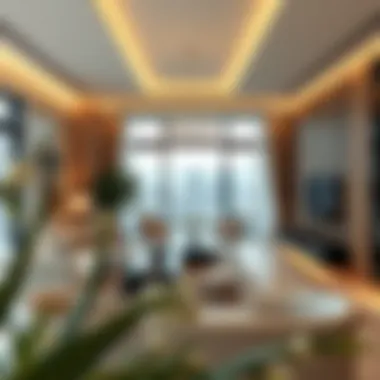Exploring Makaan Properties in Dubai's Real Estate Market


Intro
Navigating the intricate realm of real estate in Dubai can feel akin to setting sail on an unpredictable sea. With its blend of modern architecture and a rich tapestry of cultures, the Dubai property market offers a unique landscape for buyers, investors, and sellers alike. Among the various property types that catch the eye, Makaan properties stand out, integrating luxury and innovation in a market famed for its dynamic offerings. This guide aims to shed light on what these properties entail, while also unraveling market trends, investment opportunities, and practical advice for maneuvering through the buying and selling process.
Property Market Overview
When we dive into the heart of Dubai's real estate market, the first thing that strikes is its revitalizing pace. With global investors casting their nets for prime opportunities, understanding the undercurrents of demand and supply is crucial.
Current Market Trends
The real estate scene in Dubai is ever-changing, affected by a medley of factors including economic conditions, regulatory updates, and consumer preferences. Some salient trends to keep an eye on include:
- Increased interest in off-plan properties: Investors often flock to properties that are not yet completed, seeking a bigger return when the property is finalized.
- Sustainability and eco-friendly developments: There's a growing demand for properties that prioritize sustainability, appealing to environmentally conscious buyers.
- Technology integration in properties: Smart homes equipped with the latest technology are becoming increasingly popular, offering convenience and security.
"Understanding market trends is the compass that guides investors toward opportunities, helping them steer clear of potential pitfalls."
Key Neighborhood Insights
Different neighborhoods in Dubai have their unique charm and appeal, making it crucial for potential buyers to know what each area offers.
- Dubai Marina: Known for its vibrant nightlife and luxury lifestyle, it's a magnet for expatriates and high-net-worth individuals.
- Downtown Dubai: Home to iconic landmarks like the Burj Khalifa and The Dubai Mall, this central hub is a hotbed for both residential and commercial properties.
- Jumeirah Beach Residence (JBR): Flanked by stunning beaches, JBR presents a blend of residential and retail opportunities, tailored for those wanting the seaside experience.
Each of these neighborhoods holds a specific allure that can cater to diverse buyer preferences, from families to investors.
Buying and Selling Guidelines
Understanding the buying and selling landscape is a necessity for moving forward smoothly. Possessing the right tools and knowledge can make the process feel less daunting.
Essential Steps for Buyers
If you're considering buying a property in Dubai, follow these steps for a seamless experience:
- Determine your budget: Understand your financial limits and explore mortgage options.
- Research neighborhoods: Identify areas that align with your lifestyle and investment goals.
- Engage a qualified real estate agent: An expert can provide insight into the market, making the process simpler and more efficient.
- Visit properties: Always inspect properties firsthand to gauge their condition and suitability.
- Review contracts thoroughly: Contracts can be tricky - don’t rush this step; consider legal assistance if necessary.
Tips for Sellers
Sellers should employ strategic tactics to make their property stand out:
- Enhance curb appeal: First impressions matter, so invest in minor renovations that boost the property’s exterior.
- Market effectively: Use professional photography and engaging descriptions to attract potential buyers.
- Set a competitive price: Utilize recent sales data to determine a price aligned with current market trends, ensuring it's neither too high nor too low.
Each of these steps is fundamental in creating a smooth transaction process, guiding both buyers and sellers toward a successful outcome. By staying informed and prepared, you will be better equipped to navigate the challenges and seize the opportunities found within Dubai's Makaan properties.
Understanding Makaan Properties
When it comes to the vibrant real estate landscape of Dubai, grasping the concept of Makaan properties is essential. It goes beyond mere bricks and mortar; it’s about understanding the lifestyle, culture, and investment potential intertwined with these properties. This section aims to lay a solid foundation on what Makaan properties are, along with their historical significance and evolution, providing insight that will resonate with investors, buyers, and developers alike.
Definition of Makaan Properties
Makaan properties refer to the various types of real estate found mainly in urban settings, particularly in bustling places like Dubai. The term "Makaan" itself translates to "home" or "dwelling" in Arabic, encapsulating not just physical locations but also the concepts of community and belonging.
In Dubai, properties can range from luxurious villas to compact apartments, catering to a diverse population. Knowing the nuances such as zoning regulations, building codes, and community planning can be incredibly beneficial for anyone looking to make an informed decision in the real estate market.
Historical Context and Development
Understanding the historical backdrop of Makaan properties provides essential context for today’s market. Dubai has transformed from a modest fishing village into a global metropolis, thanks to visionary leadership, strategic planning, and significant foreign investment. Back in the 1960s, the concept of what constituted a home was quite different.
In those days, the landscape was dominated by simple, functional buildings designed to meet basic needs. Fast forward to today, and the skyline is peppered with towering skyscrapers and innovative architectural designs.
Several key events have shaped the development of properties in Dubai:
- Oil Discovery: This pivotal moment in the 20th century triggered economic growth and urbanization.
- Economic Diversification Initiatives: The government has focused on tourism and finance, leading to increased property developments.
- Expo 2020: Though delayed, this mega-event showcased Dubai’s potential and pushed various projects into realization.
These factors combined have influenced the market greatly, resulting in a wide array of residential and commercial options for anyone interested in investing here.
Understanding these elements is not just academic; it’s a vital piece of the puzzle for navigating the intricacies of Makaan properties. As we move further into the article, these insights will be instrumental in offering a clearer picture of what to expect in this booming real estate sector.
Types of Properties in Dubai
Navigating the real estate landscape in Dubai can feel like trying to find a needle in a haystack, given the wealth of options available. Understanding the various types of properties is crucial for investors, buyers, and sellers alike. Each type serves different needs and appetites for risk, whether one is looking to settle down in a family-friendly neighborhood, invest in a commercial space, or tap into the luxury market. This categorization aids individuals in making informed decisions, maximizing their investments while aligning with their lifestyle goals.
Residential Properties


Villas
Villas in Dubai offer a unique blend of space, elegance, and privacy, making them a sought-after choice for families and affluent buyers. One of the standout characteristics of these properties is their expansive layouts, often featured with private gardens and pools. Villas cater to a variety of lifestyles—from the bustling family needing room to grow to the luxury-seeker desiring exclusivity.
However, one must consider the maintenance costs associated with villas. While they present a golden opportunity for those who long for spacious living, the expenses for upkeep can stack up quickly. Additionally, not all villas are created equal; location plays a significant role. Properties in popular areas may command premium prices, while those in developing neighborhoods could be more affordably priced.
Apartments
Apartments represent a practical choice for many, especially for first-time buyers and those looking to invest in rental properties. The key characteristic of apartments is their accessibility and variety. From luxurious, high-rise towers to modest buildings, there truly is something for everyone.
One unique feature of apartments is the amenities that often accompany them, such as gyms, pools, and 24-hour security, which enhance the living experience. They also tend to require a lower initial investment compared to purchasing a villa, making them more attractive to investors with tighter budgets. However, prospective buyers should keep in mind the homeowners' association fees and potential restrictions on renovations, which can limit personal expression.
Townhouses
Townhouses offer a middle ground between the sprawl of villas and the compact living of apartments. They are characterized by shared walls, which typically means they are lower in price compared to detached homes. This type of property is particularly appealing to those who want a bit more space than an apartment provides but are not ready for the commitment of a villa.
One distinct advantage of townhouses is that they often come with small yards or patios, allowing for a bit of outdoor space without the extensive upkeep that a villa may demand. Yet, their proximity to neighbors can be a turn-off for some; noise and lack of privacy may be concerns. Additionally, many townhouse developments feature community amenities, which can foster a sense of belonging but also attract a more transient crowd.
Commercial Properties
Office Spaces
In the vibrant world of Dubai's business district, office spaces are the backbone of entrepreneurship. Whether one is launching a startup or establishing a branch of a multinational company, the right office space can influence productivity and company image.
A key characteristic of office spaces is their location—being near major transport hubs or business clusters can significantly enhance visibility and accessibility. Additionally, flexible lease options are increasingly common, allowing businesses to find a space that suits their specific needs without a long-term commitment. However, not every office space fits every business model; potential renters must carefully consider the layout, facilities, and surrounding environment to ensure it mirrors their operational requirements.
Retail Outlets
Retail outlets in Dubai are a lucrative avenue for those looking to tap into the bustling consumer market. The real charm of retail spaces lies in their foot traffic and location. properties situated in commercial hubs or high-traffic areas can expect higher sales potential.
Unique features often include signage visibility and the flexibility of space configuration. Retail outlets can come with either long-term leases or short-term pop-up options, catering to various business strategies. Warnings arise when considering the significant initial investment and continuous operational costs, which can be burdensome for fledgling businesses.
Industrial Properties
Industrial properties present a different realm compared to traditional commercial spaces. These properties, usually located away from residential areas, cater to manufacturing, logistics, and warehousing needs. Their key characteristic is the substantial square footage they offer, allowing businesses to operate efficiently without spatial constraints.
These properties are beneficial for their adaptability. They can be customized to meet specific operational requirements, whether it’s storage or assembly lines. However, potential investors should keep an eye on zoning regulations and ensure that any intended industrial use is permissible. Moreover, location is paramount; properties situated in areas with easy access to transportation routes can dramatically reduce overhead costs.
Luxury Properties
Penthouses
Penthouses are the crown jewels of Dubai's skyline, often providing breathtaking views and lavish amenities. What sets them apart is their exclusivity—often occupying the top floor of a building, these properties offer not just a living space but a lifestyle. Investors and affluent buyers see them as status symbols.
Unique features usually include expansive outdoor terraces, private elevator access, and top-notch finishes, adding to the appeal. However, the cost of entry is high, making them less accessible to the average buyer. Additionally, resale value can be influenced by market trends significantly, which might deter some prospective buyers.
Exclusive Listings
Exclusive listings represent properties that are often not advertised on the conventional market, providing buyers a unique opportunity to find hidden gems in Dubai’s real estate landscape. The key characteristic of these listings is the potential for privacy and less competition, as they’re not front-and-center in typical real estate searches.
These exclusive properties often come with premium features such as bespoke design and prime locations. However, buyers must navigate a more complex buying process, often requiring connections with real estate professionals who specialize in these hidden opportunities. Potential buyers should ensure they conduct thorough due diligence and understand the valuation before making a commitment.
In the world of Dubai real estate, understanding the diverse property types available can vastly improve one’s chances of making an informed investment.
Market Trends in Dubai Real Estate
The landscape of Dubai's real estate market is a kaleidoscope of opportunities and challenges. Understanding market trends is not merely an academic exercise; it's central to making informed decisions whether you’re a buyer, seller, or investor. These trends not only reflect current conditions but also signal where the market may head, helping stakeholders navigate the complex environment effectively. Keeping a finger on the pulse of these trends allows individuals to strategize better and seize opportunities that may otherwise slip through the cracks.
Current Market Overview
The current real estate market in Dubai is characterized by an intriguing blend of resilience and dynamism. With ongoing development projects, a steady influx of expatriates, and government initiatives to bolster the sector, the market presents a fertile ground for investments. Recent reports indicate a rise in property transactions, signaling renewed confidence among buyers. The demand for both residential and commercial properties has shown a significant uptick, reflecting a diversification in investment preferences among consumers. The allure of Dubai remains strong, with its robust infrastructure and diverse lifestyle options.
Factors Driving Market Changes
Economic Indicators
Economic indicators play a pivotal role in shaping the real estate landscape. Key metrics such as GDP growth, employment rates, and inflation trends can give insights into the overall health of the economy. In Dubai, the recent positive trends in economic performance have encouraged buyers to take the plunge. When people sense a growing economy, they tend to invest more confidently, believing that their property values will appreciate in the long run. However, one must keep an eye on inflation, as it can eat into purchasing power, making homes pricier. The local economy's vitality stands as a crucial characteristic benefitting the real estate segment.
Government Policies
The framework set out by government policies plays a critical role in influencing market dynamics. Policies that promote ease of doing business, transparency, and foreign ownership tend to foster growth in the property sector. Recently, the Dubai government has introduced various reforms to enhance investor confidence, such as long-term visa options for property investors. This proactive approach not only attracts foreign capital but also creates a more stable environment for local investors. Still, while some policies are advantageous, others can impose limitations or add complexities, making it essential to stay informed to navigate the regulatory landscape effectively.
Foreign Investment Trends


The trends in foreign investment are instrumental in propelling the Dubai real estate market forward. International investors see Dubai as a prime location, given its strategic position and quality of living. Recent spikes in foreign investment have been welcomed, particularly from countries that see Dubai as a stable haven for capital. This influx brings innovation and differentiation in property offerings, enriching the local market. Yet, it’s crucial to be cautious as fluctuations in global markets could similarly impact local real estate dynamics. The ability to adapt and respond to these trends can be the linchpin for success in the Dubai real estate arena.
"Navigating the waters of real estate investment without understanding market trends is like sailing without a compass; you may get somewhere, but it likely won't be where you intended."
By keeping an eye on these market trends, investors and buyers can hone their strategies, ensuring that they stay ahead of the curve and make informed choices in a landscape that is as exciting as it is complex.
Investment Opportunities in Makaan Properties
Investing in Makaan properties can be a compelling venture for anyone looking to capitalize on Dubai's thriving real estate market. The significance of exploring these investment opportunities lies in understanding the dual advantages they offer – substantial returns and the chance to diversify your portfolio. From residential units to commercial spaces, Makaan properties come with potential that can cater to various investment strategies. As the global spotlight continues to shine on Dubai, savvy investors realize that the market is not just a temporary goldmine, but a flourishing landscape ripe for exploration and engagement.
Long-Term vs Short-Term Investment
When considering an investment in Makaan properties, the first choice that comes into play is whether to approach it as a long-term or short-term endeavor. Both strategies come with their unique sets of advantages and challenges, appealing to different kinds of investors.
- Long-Term Investment
Investing in properties for the long haul can yield significant rewards. This approach often provides stability and appreciation over time. Investors can benefit from steady rental income, which can cover mortgage payments and other expenses. - Short-Term Investment
On the flip side, short-term investments often focus on up-and-coming neighborhoods where properties can be bought, renovated, and sold at a profit quickly. Flipping houses is a popular strategy among investors looking to gain quick returns.
- Pros:
- Cons:
- Potential for greater property appreciation
- Long-term cash flow through rental income
- Stable investment in uncertain economic climates
- Requires patience and commitment to maintaining the property
- Risk of fluctuations in property value over years
- Pros:
- Cons:
- Potential for immediate returns
- Engaging with the market shifts can be lucrative
- Greater risk if property values decline
- More intensive management and renovation work required
Ultimately, the choice between long-term and short-term investment hinges on individual risk tolerance, the current economic climate, and specific investment goals. Each pathway can lead to profitable outcomes if navigated thoughtfully.
Rental Income Potential
One of the key attractions of Makaan properties is the rental income potential. Investors often turn to residential properties, such as apartments or villas, as they can provide a consistent cash flow stream while the property appreciates in value. When buyers acquire a rental property, they frequently look for areas with a high demand for tenants.
- Considerations for Rental Income include:
- Choosing properties in desirable neighborhoods, which often have lower vacancy rates.
- Understanding local rental laws and regulations to ensure compliance.
- Balancing tenant management needs with gathering rental income efficiently.
Greater rental income potential can translate directly into improved returns on investment. Investors should conduct thorough market research to identify where rental demand is high, thus maximizing their revenue.
Role of Property Appreciation
Property appreciation is a vital aspect of any successful investment portfolio. For Makaan properties, appreciation refers to the increase in the property value over time. A robust appreciation rate can significantly influence long-term wealth accumulation.
- Key Factors Influencing Property Appreciation:
- Economic Growth: Regions experiencing economic booms tend to see their property values soar.
- Infrastructure Development: New transports or community amenities often lead to a rise in adjacent property values.
- Market Demand: A low supply of properties in high-demand locations can cause significant price increases.
Investors should keep an eye on both macro and micro-economic indicators. Being informed on government policies and local developments plays a key role in predicting which areas are likely to see strong future appreciation. A well-timed investment, coupled with a solid understanding of these factors, can pave the way for impressive value increases.
"A successful property investment doesn’t merely depend on location. It demands insight into future trends and market shifts."
Navigating the Buying Process
Understanding the process of buying Makaan properties is crucial for anyone stepping into the bustling Dubai real estate market. With the stakes being high—both financially and emotionally—being well-informed can be the key to making sensible decisions that serve your long-term interests.
The buying process involves multiple steps, each demanding careful consideration. From finding the perfect property to negotiating terms, every phase is a puzzle piece in the larger picture. The more equipped you are with knowledge, the better choices you can make.
Choosing the Right Property
Location Considerations
A property’s location is perhaps its most defining characteristic. In the context of Dubai's vibrant landscape, location can either be a boon or a bane. It affects not just lifestyle but potential resale value, neighborhood amenities, and overall livability.
When browsing properties, consider proximity to critical infrastructure like schools, hospitals, and public transport. Areas like Dubai Marina or Downtown Dubai often rank high due to their bustling life and accessibility. Moreover, locations near upcoming developments can be particularly appealing; they may present a valuable investment as these areas evolve.
However, a trade-off exists in the form of price points. Highly sought-after areas can command steep rates, making them less accessible for first-time buyers or those on a budget. Weighing these factors is essential.
Budgeting and Financing Options
Budgeting is another cornerstone of the buying process. Understanding how much you can afford involves more than just the property price; additional costs include registration fees, maintenance, and potential renovations. This leads to the discussion of financing options, which range from mortgages to government-backed loans.
- Evaluate your financial health: Ensure your credit score is in a healthy range, as this affects loan approval and interest rates.
- Research governmental financial assistance: Programs tailored for first-time buyers can significantly ease the burden.
- Explore various mortgage providers: Each lender offers different terms. Make sure you compare these options diligently.


A unique feature of budgeting is that it not only covers immediate purchasing costs but also allows for future financial stability. A well-planned budget allows you to explore more luxury options without compromising your financial security, ensuring that the investments you make today will not lead to hardships tomorrow.
Engaging Real Estate Agents
Navigating the intricacies of the real estate market can be daunting. Here’s where engaging a qualified real estate agent becomes invaluable. An expert can guide you through the labyrinth of offers, inspections, and negotiations, ensuring you’re not left high and dry. They know the ins and outs of the local market and can help you find opportunities that might not be readily visible.
The Role of Property Inspectors
Conducting due diligence is non-negotiable when buying Makaan properties. Engaging property inspectors can illuminate underlying issues in a prospective home. These professionals assess everything from structural integrity to compliance with local regulations. Their insights are crucial for avoiding unexpected expenses post-purchase, allowing you to make an informed decision about the property.
"A property inspector can save you from buying a money pit disguised as a dream home."
In summary, navigating the buying process requires a blend of strategic thinking and due diligence. By understanding location dynamics, budgeting wisely, leveraging the expertise of real estate agents, and investing in property inspections, buyers can make more informed decisions that protect their interests and lead to successful outcomes in the bustling Dubai real estate market.
Selling Makaan Properties
Selling properties in Dubai can be both an exciting and daunting undertaking. The vibrant market presents numerous opportunities but also comes with its unique challenges. It’s crucial to understand the complexities involved in the selling process, as accurate preparation and savvy marketing strategies are paramount in attracting potential buyers.
There are several considerations to keep in mind when selling Makaan properties. The competitive nature of the Dubai real estate market means that sellers must present their properties in the best light possible. Factors such as property condition, location, and pricing play critical roles in facilitating a smooth sale. Additionally, understanding market trends can give one a significant advantage, as timing can greatly affect the sale’s outcome.
In this guide, we delve into essential aspects of selling Makaan properties, focusing on effective preparation, innovative marketing strategies, and negotiation skills. By addressing these key elements, sellers can optimize their sales experience, ensuring a beneficial result.
Preparing Your Property for Sale
Preparation is key when it comes to selling a property. First impressions can make or break a deal, so sellers should consider investing time and resources into making their property more appealing. This involves everything from basic clean-up to more significant renovations.
Cleanliness is non-negotiable. Prospective buyers tend to envision their future in a home that feels fresh and welcoming. A good scrub and minor repairs—like fixing leaky faucets or touching up paint—can work wonders. Additionally, staging the home can create an inviting atmosphere, enabling buyers to imagine themselves living there. This may involve rearranging furniture or even renting pieces to create a stylish impression.
Moreover, it pays to understand local market conditions; this includes analyzing similar properties in the area to gauge what buyers are looking for. Keeping up with current home features and trends can help tailor the property to potential buyers’ expectations. Is a modern kitchen trending? If so, minor upgrades might catch buyers' eyes and elevate the property's perceived value.
Marketing Strategies
Marketing is where the seller’s creativity can shine. In a bustling marketplace like Dubai, leveraging both digital and traditional marketing methods can broaden the reach to potential buyers.
Digital Marketing Channels
Digital marketing has transformed how properties are advertised. Platforms like Instagram, Facebook, and real estate websites allow sellers to showcase properties through stunning visuals and detailed descriptions. The key characteristic of these digital channels is their ability to reach a global audience, attracting a diverse range of interested buyers.
The significant advantage of digital marketing is its cost-effectiveness. Compared to traditional methods, online advertising often requires less financial investment while offering superior targeting capabilities. Sellers can employ geo-targeting strategies to reach specific demographics in various regions. Additionally, engaging with potential buyers through social media can create rapport and trust, further enhancing the chance of a successful sale. The downside, however, is that competition is fierce, and properties can get buried beneath a pile of other listings without an effective strategy.
Effective digital marketing can make your property stand out in a saturated market.
Traditional Advertising Methods
Despite the surge in digital marketing, traditional advertising methods still hold value, especially for certain demographics. Billboards, newspapers, and local magazines reach readers who may not be as engaged in the digital realm. This approach often goes hand-in-hand with creating community connections and generating local interest in available properties.
A key aspect of traditional advertising is its tactile nature; physical brochures and flyers can leave a lasting impression, allowing buyers to easily revisit details when they’re ready to act. However, this method can often incur higher costs and may not provide the same level of targeted outreach as digital marketing.
Effective Negotiation Tactics
Negotiation plays a crucial role in finalizing property sales. It’s essential to approach negotiations with clear objectives and a solid understanding of the property's market value. Building rapport with potential buyers can open channels for more fruitful discussions. Listen actively to the buyer’s needs and be ready to compromise on less critical terms while holding firm on primary aspects to ensure a successful agreement.
The selling process encapsulates more than just transferring ownership of a property. It involves strategic preparation, savvy marketing, and strong negotiation skills, leading to a rewarding experience for both sellers and buyers.
Future Outlook for Makaan Properties
The future of Makaan properties is a topic that resonates deeply with a variety of stakeholders involved in Dubai's thriving real estate market. Investors, buyers, agents, developers, and sellers all have a vested interest in understanding the forthcoming trends and anticipated growth in property values. With rapid urbanization and a multi-faceted economy, knowing where the market is headed can be the difference between a golden opportunity and a missed chance.
Projected Market Growth
In recent years, the Dubai real estate landscape has witnessed robust growth, making it a desirable destination for both local and international investors. Statistics show an upward trajectory in property values due to factors such as regulatory reforms, economic diversification, and a burgeoning expatriate population.
As we look ahead, the projected market growth is influenced by several elements:
- Economic Resilience: The UAE's economy is robust, with efforts in sectors like tourism and technology enhancing its appeal.
- Population Increase: With a growing number of expatriates choosing to live and work in Dubai, there’s an increased demand for housing.
- Government Initiatives: Policies aimed at attracting foreign investments and simplifying the buying process are likely to bolster property transactions.
- Sustainability Practices: Rising awareness regarding environmental responsibility is paving the way for sustainable developments.
A bullish outlook suggests sustained appreciation in property values, with returns on investment likely to be favorable. As investors survey the horizon, aligning with projected growth can yield significant benefits.
Emerging Trends in Property Designs
The design of Makaan properties is evolving to meet the demands of modern living while reflecting the vibrant culture of Dubai. Some notable trends shaping property designs include:
- Smart Home Features: Homebuyers are increasingly drawn to properties equipped with IoT devices to enhance living experiences. This includes smart lighting systems, security, and energy management features.
- Sustainability: Eco-friendly designs are gaining traction, with energy-efficient materials and landscaping becoming popular. Not only do these designs appeal to environmentally conscious buyers, but they also reflect a shift towards sustainable living.
- Community-Oriented Spaces: There is a growing emphasis on communal areas that foster interaction, such as green spaces, playgrounds, and recreational facilities.
- Open Layouts: Many new properties are adopting open floor plans to create a sense of spaciousness and flexibility in living arrangements.
The synergy between emerging architectural trends and market expectations presents a significant opportunity for investors. Properties that showcase innovative designs and sustainable features are likely to garner higher interest in the competitive landscape.
"As the real estate market adapts to changing consumer preferences, the importance of keeping an eye on design trends cannot be overstated. Future developments will not just be about brick and mortar but about creating livable, memorable spaces that cater to the demands of today’s inhabitants."
In summary, understanding the future outlook for Makaan properties is more than just a cursory glance into growth metrics. It involves assessing the shifts in buyer preferences, economic health, and design trends that are shaping Dubai's skyline. By staying informed and discerning, stakeholders can position themselves successfully within this vibrant market.











